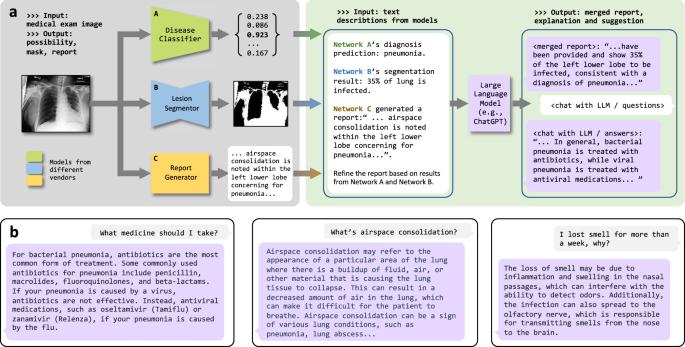Interactive computer-aided diagnosis on medical image using large language models
引用次数: 0
Abstract
Computer-aided diagnosis (CAD) has advanced medical image analysis, while large language models (LLMs) have shown potential in clinical applications. However, LLMs struggle to interpret medical images, which are critical for decision-making. Here we show a strategy integrating LLMs with CAD networks. The framework uses LLMs’ medical knowledge and reasoning to enhance CAD network outputs, such as diagnosis, lesion segmentation, and report generation, by summarizing information in natural language. The generated reports are of higher quality and can improve the performance of vision-based CAD models. In chest X-rays, an LLM using ChatGPT improved diagnosis performance by 16.42 percentage points compared to state-of-the-art models, while GPT-3 provided a 15.00 percentage point F1-score improvement. Our strategy allows accurate report generation and creates a patient-friendly interactive system, unlike conventional CAD systems only understood by professionals. This approach has the potential to revolutionize clinical decision-making and patient communication. Wang et al. developed a machine learning strategy for improving large language model to understand and analyse visual medical information. Their framework seamlessly integrates medical image computer-aided diagnosis networks with large language models, converting medical image inputs into a clear and concise textual summary of the patient’s condition.

利用大型语言模型对医学影像进行交互式计算机辅助诊断
计算机辅助诊断(CAD)推动了医学影像分析的发展,而大型语言模型(LLMs)也显示出了临床应用的潜力。然而,LLMs 在解释医学图像方面却举步维艰,而医学图像对决策至关重要。在这里,我们展示了一种将 LLM 与 CAD 网络相结合的策略。该框架利用 LLMs 的医学知识和推理能力,通过用自然语言总结信息来增强 CAD 网络的输出,如诊断、病变分割和报告生成。生成的报告质量更高,可以提高基于视觉的 CAD 模型的性能。在胸部 X 光检查中,与最先进的模型相比,使用 ChatGPT 的 LLM 诊断性能提高了 16.42 个百分点,而 GPT-3 的 F1 分数提高了 15.00 个百分点。与只有专业人士才能理解的传统 CAD 系统不同,我们的策略允许生成准确的报告,并创建了一个患者友好型交互系统。这种方法有望彻底改变临床决策和患者沟通。Wang 等人开发了一种机器学习策略,用于改进大型语言模型,以理解和分析可视化医疗信息。他们的框架将医学影像计算机辅助诊断网络与大型语言模型无缝集成,将医学影像输入转化为清晰简洁的病人病情文本摘要。
本文章由计算机程序翻译,如有差异,请以英文原文为准。
求助全文
约1分钟内获得全文
求助全文

 求助内容:
求助内容: 应助结果提醒方式:
应助结果提醒方式:


